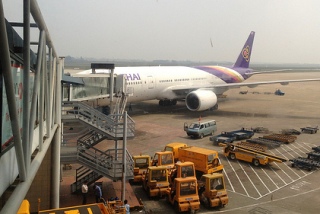 The aviation industry of Vietnam can increase its contribution to the country’s economic growth if national infrastructure and connectivity are adequately developed, but any developmental plans should be well planned and executed, according to the International Air Transport Association (IATA).
The aviation industry of Vietnam can increase its contribution to the country’s economic growth if national infrastructure and connectivity are adequately developed, but any developmental plans should be well planned and executed, according to the International Air Transport Association (IATA).
“Vietnam is a dynamic and rapidly growing aviation market,” said Tony Tyler, IATA’s director general and CEO. “The successful development of aviation will pay big dividends to the Vietnamese economy. It must be treated as a strategic asset and handled correctly.”
Aviation contributes US$6 billion to Vietnam’s GDP and supports over 230,000 jobs. Between 2008 and 2013, Vietnam’s passenger traffic grew by 96 percent.
Vietnam’s infrastructure is a critical component of the air transport sector which needs improvement, IATA said. Vietnam ranks 82nd in the Infrastructure Index of the World Economic Forum’s Global Competitiveness Report. Among the 10 Association of Southeast Asian Nations states, Vietnam is ranked sixth.
Vietnam is addressing these low rankings with significant investments. It has announced an aviation master plan to have 26 airports by 2020. Expansion programs are underway at Hanoi and Ho Chi Minh airports, with the new Long Thanh International Airport to be ready by 2020.
But IATA urged careful planning and industry consultation to come up with a well-thought-out regulatory structure ahead of any change to the current structure and ownership of Vietnam’s airports. Vietnam has indicated plans to open its airports to foreign investment and management, and to privatize the Airports Corporation of Vietnam.
“While airport privatization can provide access to the capital needed for infrastructure programs, we have seen enough spectacular examples of unintended negative consequences to urge caution. The most common being unjustified increases in charges or under-investment in the CAPEX plan as the private operator tries to squeeze out profit,” said Tyler.
“To balance the market power of privatized airports, Vietnam needs to establish an effective independent economic regulator that is in line with well-established international norms,” said Tyler. This will bring about lower charges that will also “improve the viability of routes and allow Vietnam to reap the benefits from enhanced connectivity and increased traffic.”
For the passenger sector, Tyler said the implementation of IATA’s Fast Travel program and the easing of visa requirements will improve the passenger experience in Vietnam.
Tyler encouraged Vietnam to make it a priority to implement the six Fast Travel initiatives covering check-in, self-tagging of baggage, document check, flight rebooking, self-boarding, and bag recovery. “Passengers have told us through the IATA Global Passenger Survey that they want to be able to do more things themselves. As Vietnam develops its airport infrastructure, it has the opportunity to build them around the self-service expectations of travelers,” said Tyler.
He also urged a review of the visa requirements to enter Vietnam, saying, “Easing visa requirements can boost tourism.” In the Henley & Partners index of Visa restrictions, Vietnam ranks at 81 because only 47 nationalities do not require a visa to enter, as compared to Singapore (5th), Malaysia (8th), and Hong Kong (15th).
On airfreight, meanwhile, adopting an e-freight policy “will help to improve the efficiency of Vietnam’s air cargo industry,” he continued.
While airfreight accounts for a very small amount of Vietnam’s trade by volume, it represents 25 percent of Vietnam’s trade by value, or $29 billion. “I urge Vietnam to ratify MC99 [Montreal Convention 99] quickly so that greater efficiencies can be achieved in Vietnam’s air cargo sector,” said Tyler.
MC99 provides the legal framework for the use of electronic document of carriage, paving the way for freight forwarders and airlines to use the e-AWB.
Photo: David McKelvey




